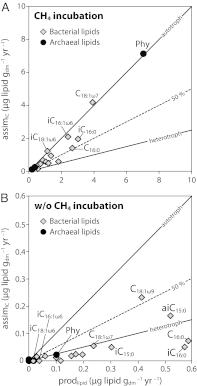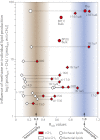Autotrophy as a predominant mode of carbon fixation in anaerobic methane-oxidizing microbial communities
- PMID: 23129626
- PMCID: PMC3511159
- DOI: 10.1073/pnas.1208795109
Autotrophy as a predominant mode of carbon fixation in anaerobic methane-oxidizing microbial communities
Abstract
The methane-rich, hydrothermally heated sediments of the Guaymas Basin are inhabited by thermophilic microorganisms, including anaerobic methane-oxidizing archaea (mainly ANME-1) and sulfate-reducing bacteria (e.g., HotSeep-1 cluster). We studied the microbial carbon flow in ANME-1/ HotSeep-1 enrichments in stable-isotope-probing experiments with and without methane. The relative incorporation of (13)C from either dissolved inorganic carbon or methane into lipids revealed that methane-oxidizing archaea assimilated primarily inorganic carbon. This assimilation is strongly accelerated in the presence of methane. Experiments with simultaneous amendments of both (13)C-labeled dissolved inorganic carbon and deuterated water provided further insights into production rates of individual lipids derived from members of the methane-oxidizing community as well as their carbon sources used for lipid biosynthesis. In the presence of methane, all prominent lipids carried a dual isotopic signal indicative of their origin from primarily autotrophic microbes. In the absence of methane, archaeal lipid production ceased and bacterial lipid production dropped by 90%; the lipids produced by the residual fraction of the metabolically active bacterial community predominantly carried a heterotrophic signal. Collectively our results strongly suggest that the studied ANME-1 archaea oxidize methane but assimilate inorganic carbon and should thus be classified as methane-oxidizing chemoorganoautotrophs.
Conflict of interest statement
The authors declare no conflict of interest.
Figures



References
-
- Reeburgh WS. Methane consumption in Cariaco trench waters and sediments. Earth Planet Sci Lett. 1976;28:337–344.
-
- Reeburgh WS. Oceanic methane biogeochemistry. Chem Rev. 2007;107(2):486–513. - PubMed
-
- Hinrichs K-U, Hayes JM, Sylva SP, Brewer PG, DeLong EF. Methane-consuming archaebacteria in marine sediments. Nature. 1999;398(6730):802–805. - PubMed
-
- Boetius A, et al. A marine microbial consortium apparently mediating anaerobic oxidation of methane. Nature. 2000;407(6804):623–626. - PubMed
Publication types
MeSH terms
Substances
Associated data
- Actions
- Actions
- Actions
- Actions
- Actions
- Actions
- Actions
- Actions
- Actions
- Actions
- Actions
- Actions
- Actions
- Actions
- Actions
- Actions
- Actions
- Actions
- Actions
- Actions
- Actions
- Actions
- Actions
- Actions
- Actions
- Actions
- Actions
- Actions
- Actions
- Actions
- Actions
- Actions
- Actions
- Actions
- Actions
- Actions
- Actions
Grants and funding
LinkOut - more resources
Full Text Sources
Molecular Biology Databases

